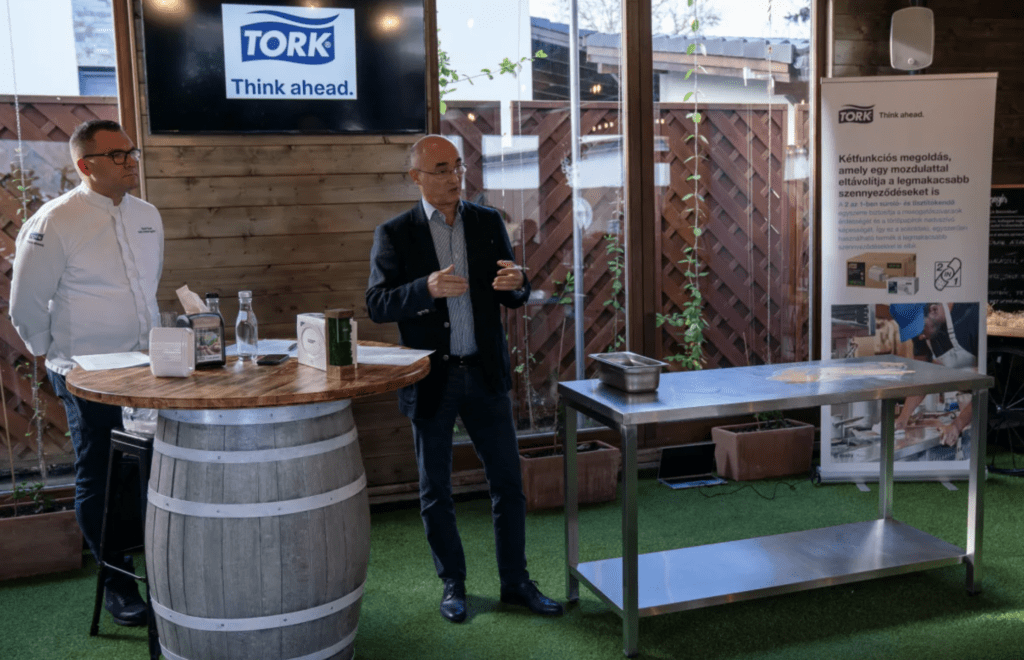Here’s how companies can reduce their hygiene carbon footprint in four steps
With smart solutions, companies can reduce waste, reduce their carbon footprint and improve operational efficiency. Recently recognized as a Superbrand again, Tork offers four practical steps to help its customers achieve their sustainability goals in the field of hygiene.

Sustainability is playing an increasingly important role in business success. One area where businesses – whether they are restaurants, offices or shopping malls – can make big strides in this area is hygiene.
According to a Harvard Business Review study, companies with a strong sustainability program have 55% higher employee satisfaction[1] and up to 19% more favorable investor reviews[2]. Going green is also important for customers: according to the first Tork Insight survey, 67% of public restroom users would like their operator to consider sustainability in the field of hygiene.[3]
Drawing on 32 years of experience in the Hungarian professional hygiene market, Tork offers four steps that businesses can take to minimize waste from hygiene products in their operations. These steps are also in line with the new Tork Focus4 Sustainability program, which provides customers with reliable sustainability data to help them achieve their goals.
Step 1: Smart Production
Sustainable production methods play a crucial role in reducing environmental impact. In Hondouville, France, where Tork manufactures a significant portion of its paper hygiene products for the Hungarian market, 25,000 tons of waste are recycled annually[4]. This includes the recycling of paper fibers from food and beverage packaging, including cartons containing plastic or aluminum, thereby reducing the need for newly mined raw materials and promoting the implementation of a circular economy.
Step 2: Smart Dispensing
Efficient design is key to reducing waste. Single-sheet dispensers allow users to only use the amount of tissue they need, reducing paper consumption by up to 40%. Single-sheet dispensers help to avoid waste while ensuring maximum hygiene compliance through their closed system. With such dispensing systems, companies can reduce waste and operating costs without compromising quality. Certified carbon-neutral dispensers powered by renewable energy help further achieve environmental goals.
Step 3: Smart Packaging
Packaging waste can contribute significantly to environmental impact. Innovations such as toilet rolls without an inner cardboard or plastic core can reduce packaging waste by up to 89%. This design not only reduces the amount of waste going to landfill, but also makes the work of cleaning teams easier, as less waste needs to be handled. In addition to the increased capacity, compacted hand towels also offer additional benefits: they take up 50% less space during transport, reducing storage requirements and logistics costs.
Step 4: Smart recycling
Recycling hygiene products is now a reality. Tork PaperCircle® is the first program to collect and recycle used paper hand towels, reducing waste by up to 20% and carbon emissions by 40%. In a building with 800 employees, such a service can save around 190 kg of CO₂ per month[5]. The initiative is based on collaboration between companies, facility managers and recycling partners and aims to transform waste into new resources for production. Thus, step 4 becomes step 1, thus closing the circular economy.
Related news
dm welcomes customers with stable prices and a superb price-value ratio
🎧 Hallgasd a cikket: Lejátszás Szünet Folytatás Leállítás Nyelv: Auto…
Read more >ESG: the majority don’t ask for postponement, preparedness level is increasing
🎧 Hallgasd a cikket: Lejátszás Szünet Folytatás Leállítás Nyelv: Auto…
Read more >Related news
Nestlé to sell remaining ice-cream assets but commits to Froneri venture
🎧 Hallgasd a cikket: Lejátszás Szünet Folytatás Leállítás Nyelv: Auto…
Read more >40 secure jobs, sustainable solutions – new BURGER KING® in Csepel
🎧 Hallgasd a cikket: Lejátszás Szünet Folytatás Leállítás Nyelv: Auto…
Read more >








